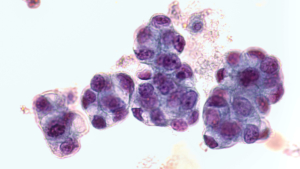The Wolpin Lab
A Lustgarten Distinguished Lab at Dana-Farber Cancer Institute

Since its founding in 1947, Dana-Farber Cancer Institute in Boston, Massachusetts, has been committed to providing adults and children with cancer with the best treatment available today while developing tomorrow’s cures through cutting-edge research.
Dana-Farber is a critical hub for advancing research from the laboratory to the clinic (a process known as pancreatic cancer translational research), initiating scientifically-driven clinical trials and identifying new approaches to early detection. The research team at Dana-Farber also analyzes pancreatic cancer subtypes to understand mechanisms of drug resistance and the genetic drivers that determine each subtype.
INTEGRATED PROGRAM BETWEEN LABORATORY & PATIENTS

Lab Leadership: Brian Wolpin, M.D., MPH
Dr. Wolpin is a medical oncologist who sees patients and serves as director of the Gastrointestinal Cancer Center, Director of the Hale Family Center for Pancreatic Cancer Research and the Robert T. & Judith B. Hale Chair in Pancreatic Cancer at Dana-Farber Cancer Institute. His research program is dedicated to the investigation of pancreatic ductal adenocarcinoma (PDAC) biology and treatment.
Dr. Wolpin has built multiple human subject resources to facilitate investigation of blood-based markers, germline alterations and somatic alterations in hundreds to thousands of subjects. He leads a highly productive collaboration of Harvard prospective cohort studies that leverages prediagnostic blood specimens to identify novel circulating markers for PDAC. His group has developed extensive expertise in analyzing markers of altered metabolism.
Dr. Wolpin serves as co-principal investigator for the Pancreatic Cancer Cohort Consortium, a multi-institutional NCI-based consortium studying inherited genetics of sporadic PDAC. Together, they have performed the first large-scale, genome-wide interrogations of genetic variation and PDAC risk. Additionally, he is chair of the NCI Pancreatic Cancer Detection Consortium Steering Committee and leads a PDAC biospecimen bank at Dana-Farber that collects patient data, blood specimens, and tumor samples for studies of new early detection and predictive biomarkers.
“In the last ten years, we’ve been able to advance science and bring new therapies to our patients. Without support from the Lustgarten Foundation, not nearly as much work would be done and not nearly as much progress would be present for our patients today. We’re very optimistic in the next year or two that the new clinical trials that are coming will provide significant advances for our patients.”
-Brian Wolpin, M.D., MPH


